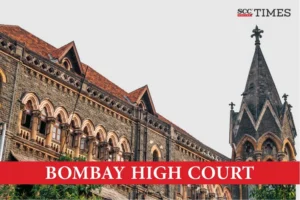Bombay High Court: The present application was filed initially for quashing FIR in a case registered with Pathardi Police Station and by way of amendment to quash and set aside entire charge sheet and proceedings in a case pending before the Judicial Magistrate First Class, Pathardi, Ahmednagar for the offence punishable under Sections 120-B, and 5063 of the Penal Code, 1860 and Section 3 of the Official Secrets Act, 1923 (‘the 1923 Act’). The Division Bench of Vibha Kankanwadi* and S.G. Chapalgaonkar, JJ., referred to Section 3 of the 1923 Act which dealt with “Penalties for spying” and observed that anything done in the police station was not included in Section 3. Thus, Applicant 1’s act of making an audio recording inside in the police station would not attract Section 3.
Counsel for applicants submitted that FIR was false and concocted. It was submitted that on 21-04-2022, three people had trespassed into applicants’ house, when their mother was alone at home. Those three people assaulted, threatened, and outraged the modesty of their mother; however, Pathardi Police Station had registered only non-cognizable case on 26-04-2022. On questioning as to why only non-cognizable case was registered, the Investigating Officer abused in filthy language and gave ill-treatment to Applicant 1. Thereafter, Applicant 1 was called by the present informant and threatened him to withdraw the complaint filed by the mother. Applicant 1 made an audio recording in respect of the said threat and made a complaint to the Director General of Police. Thus, with the said ulterior motive the present FIR was lodged and since the FIR itself was based on concoction and falsity, it deserved to be quashed and set aside.
Counsel for respondents opposed the application and submitted that Applicant 1 was unnecessarily making video and Applicant 2, who was also in police service, was threatening the informant and other police persons present in the police station.
The Court referred to the FIR and statements of witnesses under Section 1614 of Criminal Procedure Code, 1973 and noted that the entire episode had taken place in the police station and thus, police had invoked the 1923 Act.
The Court referred to Section 2(8) of the 1923 Act which defined the term “prohibited place” and noted that “police station” was not included in the definition of “prohibited place”. The Court also referred to Section 3 of the 1923 Act which deals with “Penalties for spying”. The Court observed that anything done in the police station was not included in Section 3.
The Court opined that contents of FIR did speak about insult or intimidation and thus, it was left open to the Court concerned to see whether charge needs to be framed under Section 120-B or Section 34 of IPC.
The Court partly allowed the application and quashed and set aside the proceedings in the case pending before the Judicial Magistrate First Class, Pathardi, Ahmednagar for the offence punishable under Sections 120-B, and 506 of IPC and Section 3 of the 1923 Act to the extent of offence under Section 3 of the 1923 Act only.
[Subhash Rambhau Athare v. State of Maharashtra, 2024 SCC OnLine Bom 3200, decided on 23-09-2024]
*Judgment authored by: Justice Vibha Kankanwadi
Advocates who appeared in this case :
For the Applicants: A.G. Ambetkar, Advocate
For the Respondents: N.R. Dayama, APP
Buy Penal Code, 1860 HERE
1. Corresponding Section 61 of the Nyaya Sanhita, 2023 (‘BNS, 2023’)
3. Section 351(3) of BNS, 2023
4. Corresponding Section 180 of the Nagarik Suraksha Sanhita, 2023

